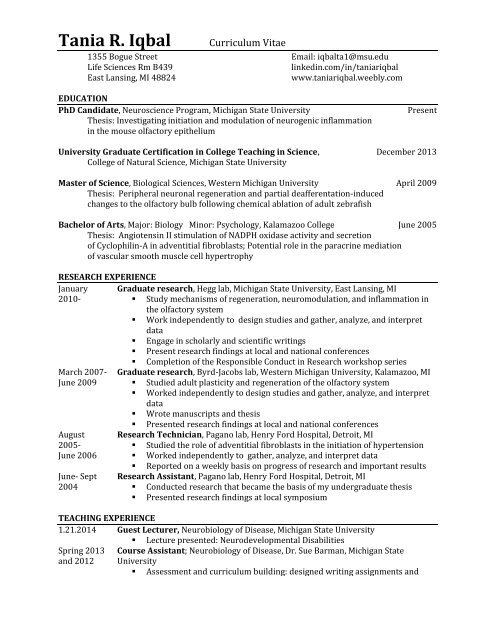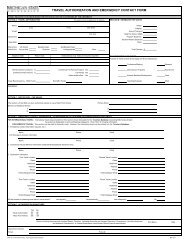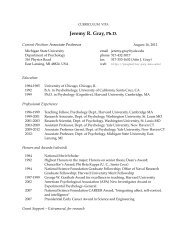Curriculum Vitae - Neuroscience Program - Michigan State University
Curriculum Vitae - Neuroscience Program - Michigan State University
Curriculum Vitae - Neuroscience Program - Michigan State University
You also want an ePaper? Increase the reach of your titles
YUMPU automatically turns print PDFs into web optimized ePapers that Google loves.
Tania R. Iqbal<br />
<strong>Curriculum</strong> <strong>Vitae</strong><br />
1355 Bogue Street Email: iqbalta1@msu.edu<br />
Life Sciences Rm B439<br />
linkedin.com/in/taniariqbal<br />
East Lansing, MI 48824<br />
www.taniariqbal.weebly.com<br />
EDUCATION<br />
PhD Candidate, <strong>Neuroscience</strong> <strong>Program</strong>, <strong>Michigan</strong> <strong>State</strong> <strong>University</strong><br />
Thesis: Investigating initiation and modulation of neurogenic inflammation<br />
in the mouse olfactory epithelium<br />
Present<br />
<strong>University</strong> Graduate Certification in College Teaching in Science, December 2013<br />
College of Natural Science, <strong>Michigan</strong> <strong>State</strong> <strong>University</strong><br />
Master of Science, Biological Sciences, Western <strong>Michigan</strong> <strong>University</strong> April 2009<br />
Thesis: Peripheral neuronal regeneration and partial deafferentation-induced<br />
changes to the olfactory bulb following chemical ablation of adult zebrafish<br />
Bachelor of Arts, Major: Biology Minor: Psychology, Kalamazoo College June 2005<br />
Thesis: Angiotensin II stimulation of NADPH oxidase activity and secretion<br />
of Cyclophilin-A in adventitial fibroblasts; Potential role in the paracrine mediation<br />
of vascular smooth muscle cell hypertrophy<br />
RESEARCH EXPERIENCE<br />
January Graduate research, Hegg lab, <strong>Michigan</strong> <strong>State</strong> <strong>University</strong>, East Lansing, MI<br />
2010-<br />
• Study mechanisms of regeneration, neuromodulation, and inflammation in<br />
the olfactory system<br />
• Work independently to design studies and gather, analyze, and interpret<br />
data<br />
• Engage in scholarly and scientific writings<br />
• Present research findings at local and national conferences<br />
March 2007-<br />
June 2009<br />
August<br />
2005-<br />
June 2006<br />
June- Sept<br />
2004<br />
• Completion of the Responsible Conduct in Research workshop series<br />
Graduate research, Byrd-Jacobs lab, Western <strong>Michigan</strong> <strong>University</strong>, Kalamazoo, MI<br />
• Studied adult plasticity and regeneration of the olfactory system<br />
• Worked independently to design studies and gather, analyze, and interpret<br />
data<br />
• Wrote manuscripts and thesis<br />
• Presented research findings at local and national conferences<br />
Research Technician, Pagano lab, Henry Ford Hospital, Detroit, MI<br />
• Studied the role of adventitial fibroblasts in the initiation of hypertension<br />
• Worked independently to gather, analyze, and interpret data<br />
• Reported on a weekly basis on progress of research and important results<br />
Research Assistant, Pagano lab, Henry Ford Hospital, Detroit, MI<br />
• Conducted research that became the basis of my undergraduate thesis<br />
• Presented research findings at local symposium<br />
TEACHING EXPERIENCE<br />
1.21.2014 Guest Lecturer, Neurobiology of Disease, <strong>Michigan</strong> <strong>State</strong> <strong>University</strong><br />
• Lecture presented: Neurodevelopmental Disabilities<br />
Spring 2013<br />
and 2012<br />
Course Assistant; Neurobiology of Disease, Dr. Sue Barman, <strong>Michigan</strong> <strong>State</strong><br />
<strong>University</strong><br />
• Assessment and curriculum building: designed writing assignments and
Iqbal CV 2<br />
rubrics to teach good science writing skills and critical thinking to<br />
undergraduate science students<br />
• <strong>Curriculum</strong> building: wrote class syllabus, sought guest lecturers,<br />
organized class schedule<br />
• Student assessment: assessed student learning through writing<br />
assignments, presentations, and class participation<br />
• Lessons presented: Neurogenic inflammation; Olfaction and<br />
Neurodegenerative Diseases; Sensorineural Deafness; Science Writing.<br />
• Managing a diverse classroom: the majority of students in this course<br />
spoke English as a second language, and received their earlier education<br />
outside of the US. Thus, I had to think about my expectations to cultivate<br />
good writing and speaking skills<br />
Fall 2010 Teaching Assistant; Learning and Memory, Dr. Sharleen Sakai, <strong>Michigan</strong> <strong>State</strong><br />
<strong>University</strong><br />
• Initiated, stimulated, and directed discussions on primary literature<br />
• Lead students to think and write critically<br />
• Student assessment: assessed student learning through poster<br />
presentations, writing assignments, and class participation<br />
• Lessons presented: Long-term habituation; Neural representation of<br />
habits; Hippocampal damage and memory; Hippocampus and spatial<br />
memory; Amygdala and emotional memory<br />
2007- 2009 Laboratory Instructor of Record; Human Physiology, Western <strong>Michigan</strong><br />
<strong>University</strong><br />
• Independently managed 2 sections of 24 students each, per semester, for 6<br />
semesters<br />
• Student Assessment: wrote and evaluated quizzes, assignments, and exams<br />
• Guided students through laboratory exercises<br />
• Lessons presented: Intro/lab math; Passive Membrane Transport; Sensory<br />
Systems; Skeletal Muscle Physiology; Human Cardiac Physiology; Blood &<br />
Immune System; Respiratory Physiology; Renal Physiology; Digestion &<br />
Metabolism<br />
Winter 2005 Teaching Assistant; Physiological Ecology, Dr. E.B Girdler, Kalamazoo College<br />
• Guided students through laboratory exercises<br />
• Student Assessment: assessed student learning through writing<br />
assignments<br />
MENTORING EXPERIENCES<br />
Summer Charlene Rivera Bonet (<strong>University</strong> of Puerto Rico- Cayey); Bridge to<br />
2013 <strong>Neuroscience</strong> <strong>Program</strong><br />
• 1 st Place Award in RISE Poster Presentations (awarded Certificate of<br />
Scholarship from UPR-Cayey)<br />
• Trained by me in a variety of experimental methods, protocol writing, and<br />
scientific communication (oral and written).<br />
• Presented her research at the Mid-<strong>Michigan</strong> Symposium for Undergraduate<br />
Summer<br />
2013<br />
Summer<br />
2011<br />
Research Experiences (Mid-SURE)<br />
Stephanie Romero Rosa and Dianarys Hernandez-Aquino (both <strong>University</strong> of<br />
Puerto Rico-Areciebo); Bridge to <strong>Neuroscience</strong> <strong>Program</strong><br />
• Trained by me in reverse transciptase polymerase chain reaction, protocol<br />
writing, scientific communication (written and oral)<br />
María Elena Castelló Toro (<strong>University</strong> of Puerto Rico- Cayey); Summer Research<br />
Opportunities <strong>Program</strong> (SROP).
Summer<br />
2007<br />
Iqbal CV 3<br />
• Trained by me in experimental methods and scientific communication<br />
(written and oral).<br />
• Presented data in a talk at the MSU Undergraduate Research Symposium<br />
and at the Committee on Institutional Cooperation SROP Conference<br />
(Columbus, OH, July 15-17).<br />
• Earned National Center for Institutional Diversity Exemplary Summer<br />
Research Citation, an award given to promote the very best scholarly work<br />
by 2011 SROP participants.<br />
Robin Franklin; Research Experiences for Undergraduates (REU) program<br />
• Trained by me in experimental techniques<br />
• Listed as an acknowledgement on publication (Iqbal and Byrd-Jacobs, 2010)<br />
TRAINING AND DEVELOPMENT IN TEACHING<br />
Spring Institute on College Teaching and Learning Workshops, <strong>Michigan</strong> <strong>State</strong> <strong>University</strong>,<br />
2013:<br />
• Why Assessment of Student Learning is so Important<br />
• Moving Forward using Backward Design: alignment of outcomes, instructional activities,<br />
and assessments<br />
• Beginning at the End: Writing Effective Learning Outcomes and Objectives<br />
• Student Learning Assessments: Purposes, Methods, and Decisions<br />
• Aligning Assessments with Institutional and <strong>Program</strong>matic Learning Goals<br />
Certification in College Teaching Workshops, <strong>Michigan</strong> <strong>State</strong> <strong>University</strong>, May 2012:<br />
• Creating and Assessing Effective Writing Assignments across the <strong>Curriculum</strong><br />
• Developing Your Teaching Presence and Philosophy<br />
• Technology in the Classroom<br />
• Improving Teaching and Learning through Assessment<br />
Inside Teaching Lounge, <strong>Michigan</strong> <strong>State</strong> <strong>University</strong><br />
<br />
Upcoming, December 2014. Co-leading a workshop on methods to teach critical reading<br />
and thinking<br />
Attended session on creating an inclusive classroom (Erik Skogsberg, 9/11/2014)<br />
Additional Teaching Workshops and Seminars:<br />
• Active Shooter and Violence Response in the Classroom with MSU Police Captain Kelly<br />
Roudebush (September 10, 2014)<br />
• Assessment Leaders Colloquium with Dr. Amy Driscoll (Feb. 11, 2014)<br />
• What it Costs to Change Your Mind with Dr. Robert Duke (Jan. 24, 2014)<br />
• <strong>Neuroscience</strong> for All with Dr. Eric Chudler (November 21, 2013)<br />
• Enhanced Learning in <strong>Neuroscience</strong> Courses: video guides and collaborative writing with<br />
Dr. Richard Olivo (September 19, 2013)<br />
• Introduction to Constructive Controversy: The Art of Arguing to Enhance Learning with Dr.<br />
Karl A. Smith; MSU Lilly Teaching Seminar (April 11, 2013)<br />
• How People Learn: The Cognitive Science Perspective with Drs. Ravizza, Hambrick,<br />
Altmann, and Mix (April 27, 2012)<br />
• <strong>Neuroscience</strong> Education with Dr. Bill Grisham (February 9, 2012)<br />
PUBLICATIONS<br />
Peer- Reviewed Manuscripts:<br />
• Jia C, Hayoz S, Hutch C, Iqbal T, Pooley A, and Hegg CC. An IP3R3- and NPY-expressing<br />
microvillous cell mediates tissue homeostasis and regeneration in the mouse olfactory<br />
epithelium. PLOS ONE, March 2013
Iqbal CV 4<br />
• Paskin TR, Iqbal TR, Byrd-Jacobs CA. Olfactory bulb recovery following reversible<br />
deafferentation with repeated detergent application in the adult zebrafish. <strong>Neuroscience</strong>,<br />
Nov 2011; 196:276-84<br />
• Jia C, Sangsiri S, Belock B, Iqbal T, Pestka JJ, and Hegg CC. ATP mediates neuroprotective<br />
and neuroproliferative effects in mouse olfactory epithelium following exposure to<br />
satratoxin G in vitro and in vivo. Toxicological Sciences, August 2011, 124(1): 169-178<br />
• Iqbal T and Byrd-Jacobs CA. Rapid degeneration and regeneration of the zebrafish<br />
olfactory epithelium following Triton X-100 application. Chemical Senses, June 2010;<br />
35(5):351-61<br />
Abstracts:<br />
• Iqbal TR, Turley A, Hayoz S, Hegg CC. Environmental irritant-initiated substance P and<br />
cytokine release in the mouse olfactory epithelium preceding processes of neuronal<br />
regeneration. <strong>Program</strong> No. 259.24. 2012. <strong>Neuroscience</strong> Meeting Planner. New Orleans, LA:<br />
Society for <strong>Neuroscience</strong>, 2012. Online<br />
• Iqbal TR, Hegg CC. Nickel sulfate inhalation causes deficits in sense of smell, possibly<br />
through irritation signaling via TRPA1, TRPV1, and NK-1 receptors. <strong>Program</strong> No.<br />
375.18.2011. <strong>Neuroscience</strong> Meeting Planner. Washington, DC: Society for <strong>Neuroscience</strong>,<br />
2011. Online<br />
• Iqbal TR, Hegg CC. Signal transduction pathways of IP3R3-containing microvillous cells.<br />
Chemical Senses v36(9): A1-A123, Oxford <strong>University</strong> Press, 2011<br />
• Paskin TR, Iqbal TR, Byrd-Jacobs CA. Reversible partial deafferentation of the zebrafish<br />
olfactory bulb with repeated detergent application. AChemS abstracts. Chemical Senses,<br />
2010, 35(7):639<br />
• Iqbal TR and Byrd-Jacobs CA. Persistent recovery of the adult olfactory epithelium<br />
following chemical lesion. <strong>Program</strong> No. 65.11, Society for <strong>Neuroscience</strong>, Washington, DC,<br />
2008. Online<br />
• Iqbal TR and Byrd-Jacobs CA. Triton X-100 treatment in zebrafish alters olfactory<br />
epithelium morphology. ISOT Abstracts. Oxford <strong>University</strong> Press, Chemical Senses, 2008,<br />
33(8), S94<br />
PRESENTATIONS<br />
Oral Presentations:<br />
MSU Graduate Academic Conference. East Lansing, MI, March 27, 2014<br />
Activation of trigeminal nerve fibers and macrophages in response to irritants of the<br />
olfactory epithelium.<br />
MSU Graduate Academic Conference. East Lansing, MI, February 15, 2013<br />
Inflammation of the nose caused by environmental irritants: implications for<br />
neuroregeneration<br />
<strong>Neuroscience</strong> <strong>Program</strong> Seminar Series, <strong>Michigan</strong> <strong>State</strong> <strong>University</strong>, October 25, 2012<br />
Environmental irritant-induced inflammation and neurogenesis in olfactory system<br />
Biological Sciences Seminar, Western <strong>Michigan</strong> <strong>University</strong>, April 2009<br />
Chemical lesioning of the adult zebrafish olfactory epithelium allows for analysis of<br />
peripheral neuronal turnover and partial deafferentation-induced changes to the olfactory<br />
bulb<br />
Poster Presentations:<br />
Upcoming: Society for <strong>Neuroscience</strong> 2014, Washington D.C. November 2014.<br />
Iqbal TR and Hegg CC Trigeminal nerve activation and initiation of neurogenic<br />
inflammation through irritant-sensing channels and secondary chemosensory cells in the<br />
mouse olfactory epithelium
Iqbal CV 5<br />
41 st Annular Pharmacology Research Colloquium, East Lansing, MI June 6, 2014<br />
Iqbal TR and Hegg CC. Signal transduction pathways of IP3R3-containing microvillous cells<br />
<strong>Michigan</strong> Chapter Society for <strong>Neuroscience</strong>, Kalamazoo, MI, May 30, 2014<br />
Iqbal TR and Hegg CC. Elucidating mechanisms of neurogenic inflammation in the mouse<br />
olfactory epithelium<br />
Association for Chemoreception Sciences. Fort Meyers, FL, April 2014<br />
Iqbal TR, Hegg CC. Activation of Trigeminal Nerve Fibers and Macrophages in Response to<br />
Irritants of the Olfactory Epithelium<br />
Society for <strong>Neuroscience</strong> 2012, New Orleans, LA, October 2012<br />
Iqbal TR, Turley A, Hayoz S, Hegg CC. Environmental irritant-initiated substance P and<br />
cytokine release in the mouse olfactory epithelium preceding processes of neuronal<br />
regeneration<br />
Society for <strong>Neuroscience</strong> 2011, Washington D.C., November 2011<br />
Iqbal TR, Hegg CC. Nickel sulfate inhalation causes deficits in sense of smell, possibly<br />
through irritation signaling via TRPA1, TRPV1, and NK-1 receptors<br />
National Directors of Graduate Studies in Pharmacology and Physiology Meeting, East Lansing, MI,<br />
July 2011<br />
Iqbal TR, Hegg CC. Signal transduction pathways of IP3R3-containing microvillous cells<br />
Association for Chemoreception Sciences XXXIII, St. Pete Beach, FL, April 2011<br />
Iqbal TR, Hegg CC. Signal transduction pathways of IP3R3-containing microvillous cells<br />
Association for Chemoreception Sciences XXXI, St. Pete Beach, FL, April 2010<br />
Paskin TR, Iqbal TR, Byrd-Jacobs CA. Reversible partial deafferentation of the zebrafish<br />
olfactory bulb with repeated detergent application<br />
<strong>Michigan</strong> Chapter Society for <strong>Neuroscience</strong>, Kalamazoo, MI, May 2009<br />
(a) Iqbal TR and Byrd-Jacobs CA. Repeated chemical lesioning produces partial<br />
deafferentation and allows for recovery of the olfactory bulb<br />
(b) Paskin TR, Iqbal TR, and Byrd-Jacobs CA. Retrograde tract tracing as a method to reveal<br />
regeneration of epithelial sensory neurons following chemical ablation<br />
Society for <strong>Neuroscience</strong>, Washington DC, November 2008<br />
Iqbal TR and Byrd-Jacobs CA. Persistent recovery of the adult olfactory epithelium<br />
following chemical lesion.<br />
International Symposium on Olfaction and Taste XV, San Francisco, CA, July 2008<br />
Iqbal TR and Byrd-Jacobs CA. Triton X-100 treatment in zebrafish alters olfactory<br />
epithelium morphology<br />
<strong>Michigan</strong> Chapter Society for <strong>Neuroscience</strong>, Detroit, MI, May, 2008<br />
Iqbal TR and Byrd-Jacobs CA. Time course of changes in olfactory epithelium following<br />
Triton X-100 application<br />
Kalamazoo Community Medical Health & Sciences Research Day. Kalamazoo, MI, April 16, 2008<br />
Iqbal TR and Byrd-Jacobs CA. Changes in olfactory epithelium thickness after Triton X-100<br />
treatments: a novel approach to adult zebrafish olfactory bulb deafferentation.<br />
Kalamazoo College Diebold Symposium, Kalamazoo, MI, April 25, 2005<br />
Iqbal TR and Pagano PJ. Angiotensin II stimulation of NADPH oxidase activity and secretion<br />
of Cyclophilin-A in adventitial fibroblasts; Potential role in the paracrine mediation of<br />
vascular smooth muscle cell hypertrophy<br />
FELLOWSHIPS, HONORS, AND AWARDS<br />
• Fellowship in Scientific Communication, Detroit Zoological Society; Fall 2014<br />
• <strong>Michigan</strong> <strong>State</strong> <strong>University</strong> Dissertation Completion Fellowship, Summer 2014<br />
• Preparing Future Faculty in the Assessment of Student Learning Fellow, 2013-2014<br />
• <strong>Michigan</strong> <strong>State</strong> <strong>University</strong> Dissertation Continuation Fellowship, Summer 2012<br />
• Outstanding Graduate Research Award, MPI Research Corporation, April 2009
Iqbal CV 6<br />
• Graduate Research and Creative Scholars Award in Biological Sciences Department,<br />
Western <strong>Michigan</strong> <strong>University</strong>, April 2009<br />
• Graduate Teaching Effectiveness Award in Biological Sciences Department, Western<br />
<strong>Michigan</strong> <strong>University</strong>, April 2009<br />
• Western <strong>Michigan</strong> <strong>University</strong> Graduate Student Travel Award, September 2008<br />
• AChemS Student Housing Award, International Symposium on Olfaction & Taste, July 2008<br />
• Best W. <strong>Michigan</strong> <strong>University</strong> Student Presentation, Kalamazoo Community Medical and<br />
Health Sciences Research Day, April 16, 2008<br />
• 2 nd Place Poster Presentation, Kalamazoo Community Medical and Health Sciences Research<br />
Day, April 16, 2008<br />
• Kalamazoo College Honors Scholarship, 2001-2005<br />
LEADERSHIP AND SERVICE ACTIVITIES<br />
<strong>Neuroscience</strong> Fair, <strong>Michigan</strong> <strong>State</strong> <strong>University</strong>, 2014<br />
• Ran a booth with activities highlighting receptive fields and touch in an outreach event<br />
geared toward children of the greater Lansing area<br />
Brain Awareness Weeks, 2010-2014<br />
• Prepared and delivered presentations to Okemos High School, Mason High School, Eastern<br />
Lansing High School, and Lewton Elementary classrooms to get students excited about<br />
science and the brain<br />
MSU Take Your Child to Work Day activities, April 25, 2013<br />
• Participated with the <strong>Neuroscience</strong> <strong>Program</strong>'s activities, which included looking at real<br />
brain specimens, identifying lab equipment, and brain related crafts<br />
<strong>University</strong> Undergraduate Research and Arts Forum, April 8, 2011<br />
• Judged student oral presentations<br />
GWIS graduate school preparation workshops, 2011<br />
• Developed and presented workshops about graduate school expectations and the<br />
application process to MSU undergraduates interested in graduate school in the sciences<br />
2010 Girls Math and Science Conference<br />
• Served as a Event Coordination volunteer<br />
2010 MSU Brain Bee Camp<br />
• Prepared and delivered a presentation on Brain Facts material to area high school students<br />
in order to prepare them for the local and national Brain Bee competitions<br />
MI SFN Conference Organizing Committee for 40 th annual meeting<br />
• Created the abstract booklet for the conference<br />
2009 <strong>Michigan</strong> Brain Bee<br />
• Wrote questions for use in the competition<br />
2008 Regional <strong>Michigan</strong> Science Olympiad<br />
• Designed an activity station for the competition<br />
Chemistry Day at the Kalamazoo Valley Museum 2006<br />
• Lead a booth about germs and health<br />
Volunteer for Autism Society of Kalamazoo, 2001-2005<br />
• Along with other students, we watched and played with the children while parents were in<br />
the society meeting. Dr. Mills of Kalamazoo College also organized fun-filled days at the<br />
College for children with autism and their families, especially their siblings, which I<br />
participated in. I also volunteered at the local Walk for Autism.<br />
PROFESSIONAL MEMBERSHIPS<br />
American Physiological Society<br />
Society for <strong>Neuroscience</strong><br />
<strong>Michigan</strong> Chapter Society for <strong>Neuroscience</strong>
Association for Chemoreception Sciences<br />
Phi Kappa Phi Honors Society<br />
Iqbal CV 7










